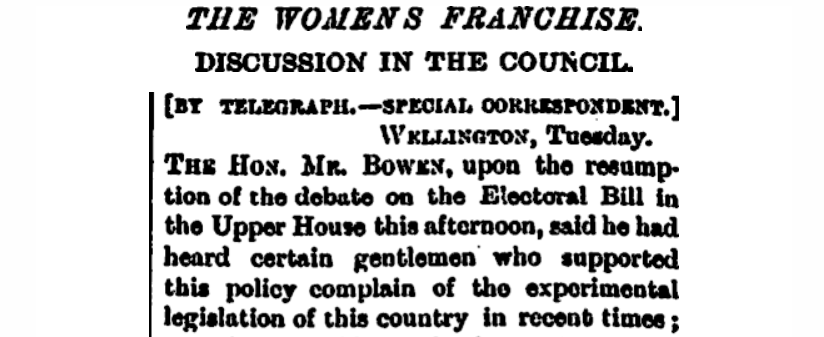130 Years Ago Today on August 23…
This year, Wintec Media of Arts students are working with the YWCA and Youth Vote to create a campaign which outlines the events leading up to September 19th, the day that Kiwi women were granted the right to vote, 130 years ago.

130 years ago today…
There was a debate on the Electoral Bill (which would give New Zealand Women the right to vote) in the Upper House of Parliament. It was a heated one, with men on both sides stating their views. Opposing the Bill, among others, was one Mr. Bowen.
“If once women gave up their present role of suggesting, advising, and peacemaking, that they may stimulate political passions, they would have committed themselves to a departure in their lives that they would forever regret”, he exclaimed.
“If a measure such as this is to be passed by this chamber, under such circumstances, the sooner this House disappears the better”.
He believed that women were the caretakers and educators of children, and who would take over this role if women were to busy themselves with political nonsense? The men? This concept seemed laughable to Mr Bowen.
His speech was met with a loud applause from the House, leaving those in support of the bill with feelings of uncertainty. Could this be the consensus? Was there any support of the bill?
But soon one Mr Oliver, a “trusted defender of women’s rights”, rose to give his rebuttal.
“It seems”, he began, “that some of us have been asleep”.
Mr Oliver continued. “We can’t do wrong by reposing trust and confidence in one half of humanity. Our duty is to justice, and let right be done, no matter which side is the grainer. We are told that certain politicians wished it because women desired to aid the temperance cause. Well, let them”.
The Temperance Movement was an attempt to rid New Zealand of its drinking problem, which many suffragettes were in support of. Those in the movement believed that alcohol was the cause of many issues, including the neglect of children, and the abuse of women.
Mr Oliver’s speech was not only based on his opinions, but on facts. He pointed out the great results that Wyoming had seen after giving women the vote. He gave evidence that showed women’s suffrage led to less crime, and less poverty.
He finished by pointing out that traditional women’s roles such as childcare, hospital management, and home labour, were not an argument against their capability to vote, but an argument for it, as these roles showed their administrative capabilities.
As we look back on this debate, we see not only the results of New Zealand women who fought for the bill to be discussed, but also the New Zealand men who saw the women in their life for what they were: people. We thank Mr Oliver, and also one Mr McGregor, for standing at our side.




